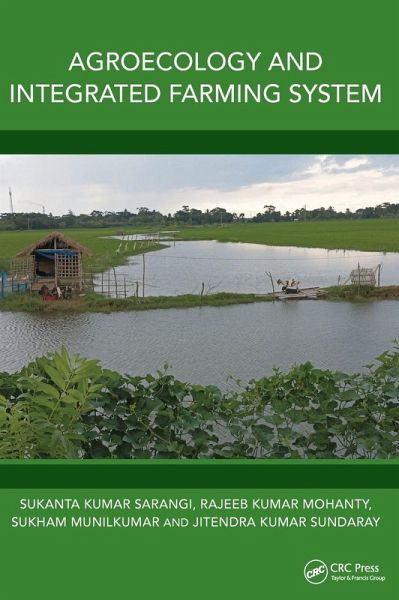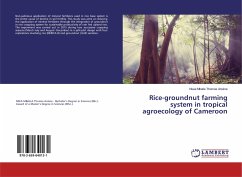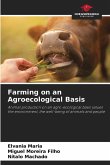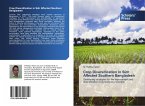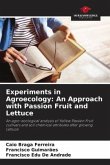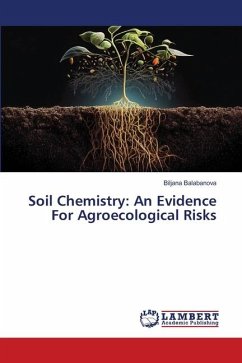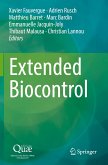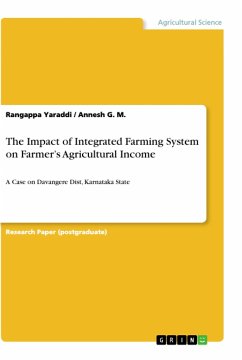Jitendra Kumar Sundaray, Rajeeb Kumar Mohanty, Sukanta Kumar Sarangi, Sukham Munilkumar
Agroecology and Integrated Farming System
Jitendra Kumar Sundaray, Rajeeb Kumar Mohanty, Sukanta Kumar Sarangi, Sukham Munilkumar
Agroecology and Integrated Farming System
- Gebundenes Buch
- Merkliste
- Auf die Merkliste
- Bewerten Bewerten
- Teilen
- Produkt teilen
- Produkterinnerung
- Produkterinnerung
This book encompasses a holistic approach towards sustainable agricultural production technologies that result in maximum profit for the farming community.
Andere Kunden interessierten sich auch für
![Rice-groundnut farming system in tropical agroecology of Cameroon Rice-groundnut farming system in tropical agroecology of Cameroon]() Nsea Mballa Thomas ArsèneRice-groundnut farming system in tropical agroecology of Cameroon26,99 €
Nsea Mballa Thomas ArsèneRice-groundnut farming system in tropical agroecology of Cameroon26,99 €![Farming on an Agroecological Basis Farming on an Agroecological Basis]() Elvania MariaFarming on an Agroecological Basis36,99 €
Elvania MariaFarming on an Agroecological Basis36,99 €![Crop Diversification in Sidr Affected Southern Bangladesh Crop Diversification in Sidr Affected Southern Bangladesh]() M. R. IslamCrop Diversification in Sidr Affected Southern Bangladesh30,99 €
M. R. IslamCrop Diversification in Sidr Affected Southern Bangladesh30,99 €![Experiments in Agroecology: An Approach with Passion Fruit and Lettuce Experiments in Agroecology: An Approach with Passion Fruit and Lettuce]() Caio Braga FerreiraExperiments in Agroecology: An Approach with Passion Fruit and Lettuce26,99 €
Caio Braga FerreiraExperiments in Agroecology: An Approach with Passion Fruit and Lettuce26,99 €![Soil Chemistry: An Evidence For Agroecological Risks Soil Chemistry: An Evidence For Agroecological Risks]() Biljana BalabanovaSoil Chemistry: An Evidence For Agroecological Risks39,99 €
Biljana BalabanovaSoil Chemistry: An Evidence For Agroecological Risks39,99 €![Extended Biocontrol Extended Biocontrol]() Extended Biocontrol132,99 €
Extended Biocontrol132,99 €![The Impact of Integrated Farming System on Farmer¿s Agricultural Income The Impact of Integrated Farming System on Farmer¿s Agricultural Income]() Annesh G. M.The Impact of Integrated Farming System on Farmer¿s Agricultural Income15,95 €
Annesh G. M.The Impact of Integrated Farming System on Farmer¿s Agricultural Income15,95 €-
-
-
This book encompasses a holistic approach towards sustainable agricultural production technologies that result in maximum profit for the farming community.
Hinweis: Dieser Artikel kann nur an eine deutsche Lieferadresse ausgeliefert werden.
Hinweis: Dieser Artikel kann nur an eine deutsche Lieferadresse ausgeliefert werden.
Produktdetails
- Produktdetails
- Verlag: Taylor & Francis Ltd
- Seitenzahl: 384
- Erscheinungstermin: 14. März 2025
- Englisch
- Abmessung: 254mm x 178mm
- ISBN-13: 9781032145648
- ISBN-10: 1032145641
- Artikelnr.: 71812578
- Herstellerkennzeichnung
- Libri GmbH
- Europaallee 1
- 36244 Bad Hersfeld
- 06621 890
- Verlag: Taylor & Francis Ltd
- Seitenzahl: 384
- Erscheinungstermin: 14. März 2025
- Englisch
- Abmessung: 254mm x 178mm
- ISBN-13: 9781032145648
- ISBN-10: 1032145641
- Artikelnr.: 71812578
- Herstellerkennzeichnung
- Libri GmbH
- Europaallee 1
- 36244 Bad Hersfeld
- 06621 890
Sukanta Kumar Sarangi obtained a BSc Agri. (1995) with a first position and Gold Medal from Odisha University of Agriculture & Technology (OUAT), Bhubaneswar; MSc Agronomy (1998) with first rank and University Gold Medal from OUAT, Bhubaneswar; and Ph.D. (2003) from Banaras Hindu University, Varanasi. Dr. Sarangi worked with Prof. M.S. Swaminathan Research Foundation (1999-2000) on conservation, utilization and enhancement of rice biodiversity. Served as Scientist (2003-2008) at ICAR-Research Complex for the North Eastern Hill Region, Meghalaya; Senior Scientist (2008-2014); and Principal Scientist (201402023) at ICAR-Central Soil Salinity Research Institute, Regional Research Station, West Bengal. Currently he heads the Division of Agricultural Technologies for Women at ICAR-Central Institute for Women in Agriculture, Bhubaneswar, Odisha, India. In his research on farming systems in hill and coastal regions, Dr Sarangi has developed resource conservation technologies for cropping systems intensification, including: a cost-effective, water-productive improved package of practices for cultivation of diverse crops; salt-tolerant varieties; integrated nutrient management practices; conservation agricultural practices; and technology for enhancing income and nutritional security of smallholder farmers. He has established strong research collaborations with several countries including Australia, Philippines, Vietnam, Bangladesh and Nepal. He has been made a Fellow of the Indian Society of Agronomy (ISA), Indian Society of Coastal Agricultural Research (ISCAR) and Association of Rice Research Workers (ARRW). He currently serves as editor of the Indian Journal of Agronomy and editor-in-chief of the Journal of the Indian Society of Coastal Agricultural Research. Rajeeb Kumar Mohanty was born in 1969 in Balasore district of Odisha. He holds a MSc in Fisheries Management (ICAR-Central Institute of Fisheries Education, Mumbai), a PhD in Aquaculture and a DSc in Environmental Science. He joined the Agricultural Research Service of ICAR and started his professional career as a scientist in 1997, and presently he is Principal Scientist (Aquaculture) at ICAR-Indian Institute of Water Management, Bhubaneswar. Dr. Mohanty has made an outstanding research contribution to aquaculture water use efficiency, water budgeting, nutritional water productivity, water footprint, EIA, bioresource technology, compensatory growth performance of IMCs, run-off recycling aquaculture, self-reliant integrated aquaculture, multiple use management of various aquaculture production systems, periphyton-based carp-SIS polyculture, semi-intensive shrimp monoculture in improving aquaculture productivity, and livelihood of small and marginal farmers. Significant work done by Dr. Mohanty is reflected through the implementation of 17 research projects of national importance as project leader, more than 140 publications in reputed high-impact journals, 8 commercialized technologies, recipient of 7 national awards such as ICAR-Team Research Award (2001-2002 and 2003 and 2004), Vasantrao Naik Award (2001 amd 2007), Indira Gandhi Rajbhasha Puraskar (2005-2006), Dr. Hiralal Chaudhuri Young Scientist Award (2003), BKJF-INCSW Team Award- 2018, NESA Fellowship-2019 and NABS Fellowship 2020, as well as five other society awards. In addition, Dr Mohanty has guided the research work of two PhD scholars and eight MSc students in the fields of aquaculture, water management and wetland ecology. Sukham Munikumar, born in Imphal, Manipur, graduated from the College of Fisheries, Ratnagiri, Maharashtra, and later went on to complete his master's and doctoral degrees from the Central Institute of Fisheries Education, Mumbai. He did his post-doctoral fellowship research at Curtin University, Perth, Australia, and attended short-term courses at Ben Gurion University, Israel and the University of Las Palmas, Gran Canaria, Spain. He has diverse experience, having worked in the shrimp hatchery industry in Andhra Pradesh and participated in a deep-sea fishing project with CMLRE (Department of Ocean Development, Ministry of Earth Sciences). He started his teaching, research and extension career as Assistant Professor (Aquaculture) at the College of Fisheries, Agartala, Tripura. He has contributed to eight externally funded projects, including four projects as Principal Investigator. He has also worked as PI on two Institutional projects as well as contributing as Co-PI to ten projects. He has guided five PhD and 11 MFSc students as a major guide and has served as an Advisory Member for six PhD and 14 MFSc students. He has coordinated more than 80 skill development programmes of seven days' duration for more than 3,000 farmers during the last 14 years. He has published more than 60 research articles and 15 book chapters, including 10 manuals. He is a Fellow of the Zoological Society of India, Bodhgaya, India, and the Applied Zoologists Research Association (AZRA), Cuttack, Odisha. Currently he is working as a Principal Scientist in the Aquaculture Division, ICAR- Central Institute of Fisheries Education (Deemed University), Mumbai. Jitendra Kumar Sundaray completed his PhD (Animal and Marine Bioresources Science) from Kyushu University, Fukuoka, Japan, and is presently working as Head, Fish Genetics and Biotechnology Division, ICAR- Central Institute of Freshwater Aquaculture, Bhubaneswar. He has served as Officer-in-Charge of the Kakdwip Research Centre of ICAR CIBA (2010-2013), Chennai. He completed his tenure (2013-2022) as Head, Division of Fish Genetics Biotechnology, ICAR CIFA and as Director, ICAR CIFA during 2017-2018. He is the pioneer team member of the first brackish water fish (seabass) breeding in India. He has published more than 132 research publications in both national and international peer-reviewed journals. He has a total citation of 2,527 and H index of 24. He has completed 12 projects as Principal Investigator and headed two externally funded projects. He has completed a Center of Excellence project from DBT on the genetic improvement of Labeo catla. He is a fellow of the Applied Zoologist Research Association, Zoological Society of India, Biotechnology Research Society of India, Inland Fisheries Society of India, Odisha Environmental Society and National Environmental Science Academy. He is the recipient of young scientist award of AZRA, ZSI and Hiralal Choudhary Foundation, ICAR CIFE, Mumbai. He is the recipient of Prof M S Swaminathan Best Fisheries Scientist for the year 2021 and Distinguished Scientist Award from the National Environmental Science Academy and Padma Shri (Dr) Ajaya Parida Life Time Achievement Award for the year 2023. He has guided two post-doctorate, two PhD and 20 MSc students. He is one of the Vice Presidents of the Applied Zoologist Research Association and he is the associate editor of the Journal of the Indian Society of Coastal Agricultural Research. He is the associate editor of Frontiers in Physiology and Frontiers in Molecular and Cellular Reproduction. He is leading a team on selective breeding and genetic improvement of carp species in India. He is currently involved in selective breeding and halogenomics.
1 Integrated Farming System: Concept, Components and Integration
2 Sustainable Integrated Farming Systems for Food and Nutrition Security
3 Integration of Enterprises and Efficient Resource Use in Diverse Farming
Systems
4 Application of Information Technology for Advanced IFS: R&D and
Integration of Modern Tools, Including Artificial Intelligence
5 Modern Tools for Greenhouse Gas Emission Estimation and Mitigation in IFS
6 Organic Farming Systems
7 In Situ Resource Generation, Nutrient Management, ITK and Use for IFS
8 Impact of Climate Change on Agriculture and Adaptations through IFS
9 IFS Models for Different Agro-climatic Zones
10 High-Value Aquaculture, Agribusiness Options and FPOs
11 Agroecology and Biodiversity
12 Rainwater Harvesting and Management for IFS
13 Socioeconomic Impact of Integrated Farming Systems (IFS)
14 Road Map for the Future: Doubling Farmers' Incomes
15 Policy Framework Requirements for the Success of IFS
2 Sustainable Integrated Farming Systems for Food and Nutrition Security
3 Integration of Enterprises and Efficient Resource Use in Diverse Farming
Systems
4 Application of Information Technology for Advanced IFS: R&D and
Integration of Modern Tools, Including Artificial Intelligence
5 Modern Tools for Greenhouse Gas Emission Estimation and Mitigation in IFS
6 Organic Farming Systems
7 In Situ Resource Generation, Nutrient Management, ITK and Use for IFS
8 Impact of Climate Change on Agriculture and Adaptations through IFS
9 IFS Models for Different Agro-climatic Zones
10 High-Value Aquaculture, Agribusiness Options and FPOs
11 Agroecology and Biodiversity
12 Rainwater Harvesting and Management for IFS
13 Socioeconomic Impact of Integrated Farming Systems (IFS)
14 Road Map for the Future: Doubling Farmers' Incomes
15 Policy Framework Requirements for the Success of IFS
1 Integrated Farming System: Concept, Components and Integration
2 Sustainable Integrated Farming Systems for Food and Nutrition Security
3 Integration of Enterprises and Efficient Resource Use in Diverse Farming
Systems
4 Application of Information Technology for Advanced IFS: R&D and
Integration of Modern Tools, Including Artificial Intelligence
5 Modern Tools for Greenhouse Gas Emission Estimation and Mitigation in IFS
6 Organic Farming Systems
7 In Situ Resource Generation, Nutrient Management, ITK and Use for IFS
8 Impact of Climate Change on Agriculture and Adaptations through IFS
9 IFS Models for Different Agro-climatic Zones
10 High-Value Aquaculture, Agribusiness Options and FPOs
11 Agroecology and Biodiversity
12 Rainwater Harvesting and Management for IFS
13 Socioeconomic Impact of Integrated Farming Systems (IFS)
14 Road Map for the Future: Doubling Farmers' Incomes
15 Policy Framework Requirements for the Success of IFS
2 Sustainable Integrated Farming Systems for Food and Nutrition Security
3 Integration of Enterprises and Efficient Resource Use in Diverse Farming
Systems
4 Application of Information Technology for Advanced IFS: R&D and
Integration of Modern Tools, Including Artificial Intelligence
5 Modern Tools for Greenhouse Gas Emission Estimation and Mitigation in IFS
6 Organic Farming Systems
7 In Situ Resource Generation, Nutrient Management, ITK and Use for IFS
8 Impact of Climate Change on Agriculture and Adaptations through IFS
9 IFS Models for Different Agro-climatic Zones
10 High-Value Aquaculture, Agribusiness Options and FPOs
11 Agroecology and Biodiversity
12 Rainwater Harvesting and Management for IFS
13 Socioeconomic Impact of Integrated Farming Systems (IFS)
14 Road Map for the Future: Doubling Farmers' Incomes
15 Policy Framework Requirements for the Success of IFS

